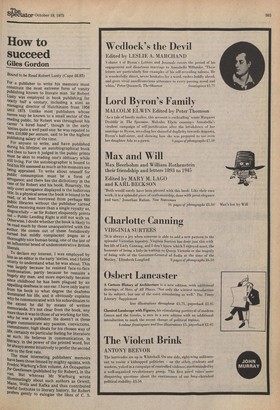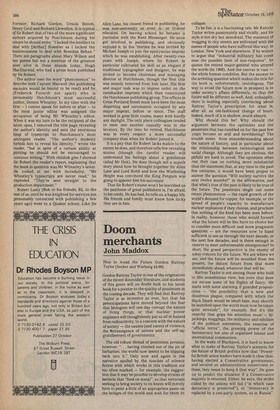How to succeed
Giles Gordon
Bound to be Read Robert Lusty (Cape £6.95) For a publisher to write his memoirs must constitute the most extreme form of vanity Publishing known to literate man. Sir Robert Lusty was employed in book publishing for nearly half a century, including a stint as managing director of Hutchinson from 1956 until 1973. Unlike most publishers whose names may be known to a small sector of the reading public, Sir Robert was throughout his career "a hired hand", though in the early 'sixties quite a well paid one: he was reputed to earn £10,000 per annum, said to be the highest Publishing salary of the time.
For anyone to write, and have published during his lifetime, an autobiographical book and then to have it judged in the public prints must be akin to reading one's obituary while still living. For the autobiographer is bound to find his life assessed as much as his memoirs are being appraised. To write about oneself for Public consumption must be a form of arrogance; and there lies the dichotomy in the case of Sir Robert and his book. Bizarrely, the only overt arrogance displayed is the ludicrous title. In a physical sense the book is bound to be read, or at least borrowed from perhaps 600 Public libraries without the publisher turned author receiving more than a single royalty as, disgracefully — as Sir Robert eloquently points out — Public Lending Right is still not with us. Otherwise, I doubt whether the book is likely to be read much by those unacquainted with the author. He comes out of these fastidiously turned but mildly complacent pages as a thoroughly nice human being, one of the last of an influential breed of undemonstrative British liberals.
To declare my interest, I was employed by him as an editor in the early 'sixties, and I failed utterly to understand what he was about. This Was largely because he resisted face-to-face confrontation, partly because he remains a hugely shy man, and more especially because since childhood he has been plagued by an appalling deafness in one ear. I have only learnt from his book to what degree the deafness dominated his life, and it obviously explains Why he communicated with his subordinates to the extent he did by means of written Memoranda. It's not clear from the book, any more than it was to those of us working for him, Why he was a publisher. He doesn't in these Pages communicate any passion, convictions, commitment, high ideals for his chosen way of ,life, certainly no particular feeling for literature
as such. He believes in communication, in literacy, in the power of the printed word, but he always seems intuitively to prefer the second rate to the first rate. The most interesting publishers' memoirs have been those limned by mighty egoists, with Fredric Warburg's.first volume, An Occupation for Gentlemen (published by Sir Robert), in the van. But whereas Mr Warburg wrote illuminatingly about such authors as Orwell, Mann, Wells and Kafka and thus contributed useful footnotes to literary history, Sir Robert Prefers gently to eulogise the likes of C. S. Forester, Richard Gordon, Ursula Bloom, Henry Cecil and Richard Llewellyn. It is typical of Sir Robert that of two of the more significant authors acquired by Hutchinson during his tenure he should write: "I lacked the intellect to deal with [Arthur] Koestler as I lacked the boisterousness to deal with Brendan Behan." There are paragraphs about Mary Wilson and her poems but not a mention of the greatest poet alive in these islands today, Hugh MacDiarmid, who had a prose book published by Sir Robert.
The author uses the word "phenomenon" to describe both Captain Maxwell (his publishing memoirs would be bound to be read) and he (Frederick Forsyth not apart) who is presumably Hutchinson's most successful author, Dennis Wheatley. In my time with the firm — I cannot speak for before or after — to the most junior editor was assigned the occupation of being Mr Wheatley's editor. When it was my turn to be the recipient of the latest opus, I removed the title page revealing the author's identity and sent the enormous heap of typescript to Hutchinson's most astringent reader. The author's modesty forbids him to reveal his identity," wrote the reader, "but in spite of a certain ability at plotting he should not be encouraged to continue writing." With childish glee I showed Sir Robert the reader's report, explaining that the book in question was Mr Wheatley's latest. He looked at me with incredulity, "Mr Wheatley's typescripts are never read," he exploded. "They're sent straight to the production department."
Robert Lusty (Bob to his friends; RL to the rest of us, until he was knighted for services not presumably connected with publishing a few years ago) went to a Quaker school. Like Sir
Allen Lane, his closest friend in publishing, he was non-university or even Aor 0-level educated. On leaving school he became a journalist with the Kent Messenger. He soon got involved in publishing, and obviously enjoyed it. In the 'thirties he was invited by Michael Joseph to join the eponymous imprint which he was establishing. After twenty-two years with Joseph, where Sir Robert in particular cultivated his skill as an elegant if traditional typographer and designer, he was invited to become chairman and managing director at Hutchinson, though the first title was meanly removed from him later. His first and major task was to impose order on the ramshackle imprints which then constituted the Hutchinson publishing group. The offices in Great Portland Street must have been the most dispiriting and unromantic occupied by any major imprint, before or since. The staff worked in grim little rooms, many with hardly any daylight. The only place colleagues tended to meet one another casually was in the lavatory. By the time he retired, Hutchinson was in every respect a more successful company than when Sir Robert joined it.
It is a pity that Sir Robert lacks malice to the extent he does, and therefore tells few revealing stories (though the careful reader will understand his feelings about a gentleman called Mr Holt). He does though tell a superb story about how he brought together Sir Allen Lane and Lord Reith and how the Wuthering Height was convinced the King Penguin was going to appoint him his successor.
That Sir Robert's name won't be inscribed on the pantheon of great publishers is, I'm afraid, to his credit. He has had, he tells us, a happy life. His friends and family must know how lucky they are in him.



































 Previous page
Previous page